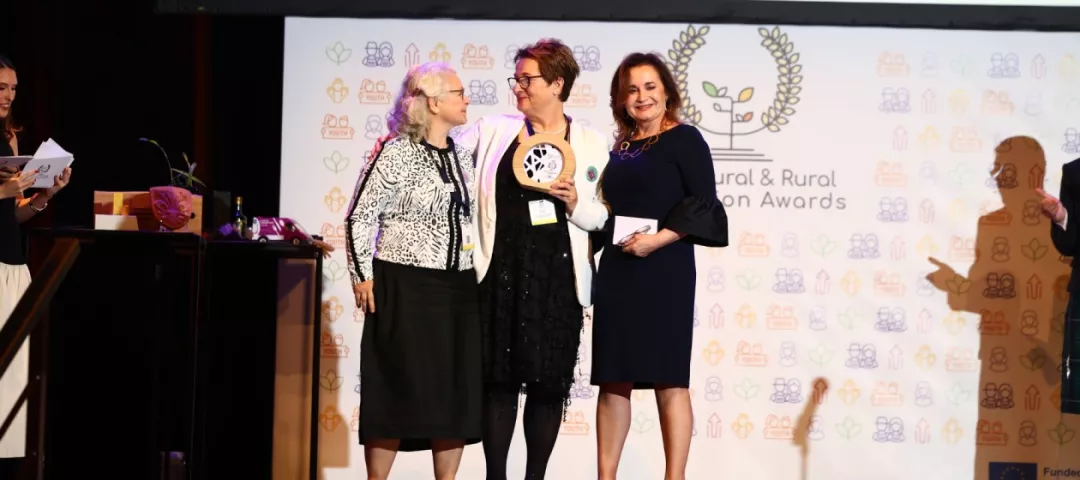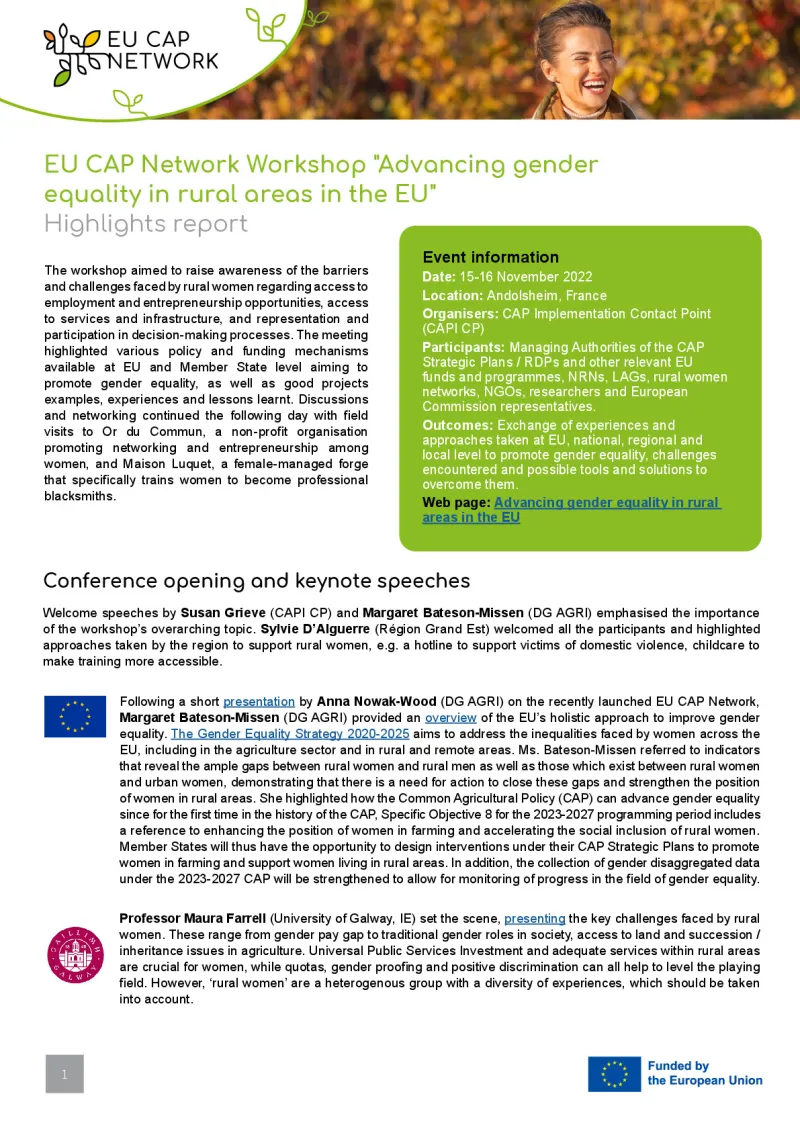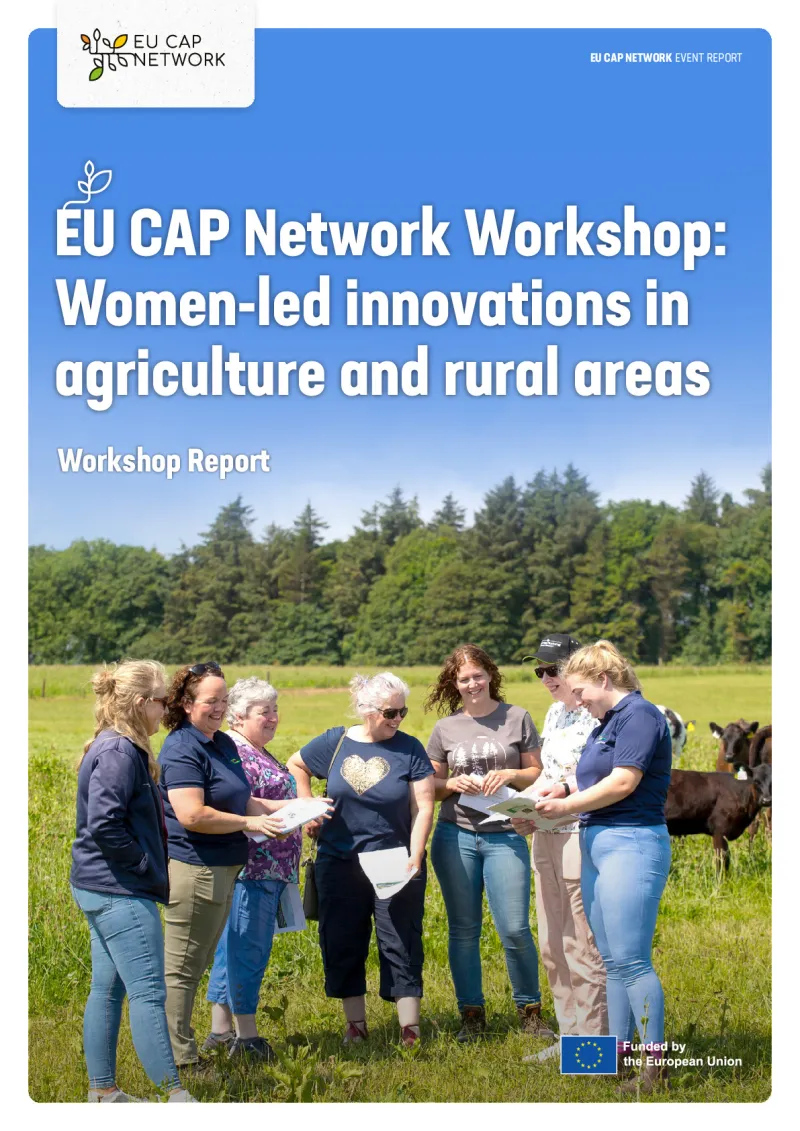ARIA 2024 – Focus on the Gender Equality Award
In the latest editions of the ARIA – Agricultural and Rural Inspiration Awards, an impressive 95% of the shortlisted projects actively involved women. The new ARIA Gender Equality Award highlighted women's crucial role for rural Europe.

The 2024 edition of ARIA – Agricultural and Rural Inspiration Awards introduces an award for Gender Equality that recognises projects led by women as well as projects that are having a concrete positive impact on women in rural communities.
During the exciting ARIA closing ceremony on 4 December, the jury delivered the Gender Equality Award to FRAU iDA – Space for women entrepreneurs, an Austrian project that is promoting women in rural areas, making their achievements more visible, improving their framework conditions, and providing them with opportunities to combine family and career.
Interestingly, in the 2023 and 2024 editions of ARIA, an impressive 95% of the shortlisted projects actively involved women, and four out of five thematic winners were projects that showcased the vital contributions of women in rural communities. This is certainly worth celebrating!
A mainstreaming approach
The EU has made significant progress in gender equality, with the European Commission now implementing its Gender Equality Strategy 2020-25, mainstreaming gender equality across all policy sectors.
The Common Agricultural Policy (CAP) supports gender equality in rural areas through the new CAP Strategic Plans (2023-2027) and particularly under Specific Objective 8, promoting employment, growth, representation in decision-making processes, participation in farming businesses, social inclusion, and local development. Many Member States are taking progressive steps in this sense: for example, as noted in the 2024 Annual Report on Gender Equality in the EU, the majority of Member States planned to include at least 50% of women in decision-making bodies for LEADER Local Action Groups.
In this context, the EU CAP Network celebrated women's contribution to EU agriculture and rural development with a special award as part of its landmark Agricultural and Rural Inspiration Awards 2024. All the 24 finalists of ARIA 2024 could compete for the Gender Equality Award, regardless of the main thematic category they related to (categories that reflect the CAP's General Objectives). This reflects the mainstreaming approach adopted by the European Commission, whereby gender equality is not a separate, isolated goal, but a matter of general interest to be promoted across the wider policy spectrum.
Women's role in rural areas – in practice
Out of 24 finalists of ARIA 2024, 17 projects actively included women in their activities and were eligible for the ARIA Gender Equality award. These projects show in practice how women contribute to several aspects of agricultural and rural development.
Leadership and innovation
The Operational Group Authentic Honey Meets DNA Technology (Estonia) is an example of how women in leadership roles are driving innovation in agricultural practices and rural development. Women made up most of the project team, and the innovative DNA tests developed by the project to trace the origin of honey are now performed by an entirely female team (office and laboratory).
Sustainable practices
Women are frequently at the forefront of implementing sustainable agricultural practices, ranging from organic farming to biodiversity conservation and climate-smart agriculture. Women often also lead projects based on the local environmental and cultural heritage. The Finnish project Lapland shepherd holidays, (managed by a female team) involved mostly women and young people in developing a sustainable rural tourism initiative and provided useful information about funding opportunities for environmental and cultural heritage projects, which are often led by women.
Community building
Women play a crucial role in building and nurturing rural communities, fostering collaboration among farmers and consumers and strengthening local food systems. A landmark example is the educational farm Pszczelandia (Poland); Małgorzata Pucer, who owns the farm with her husband Dariusz, designed and implemented the project, and now manages the farm and its educational activities. Two women were hired to work at the farm, and many more benefit from the professional and personal development opportunities offered by Pszczelandia to the local community.
Education and knowledge sharing
Many projects emphasise women's role as educators in agriculture, leading training and workshops, and sharing valuable skills and knowledge with other farmers. La Junquera is a Spanish regenerative farm owned by a female farmer, and the educational and entrepreneurial activities organised by the project see a high number of women participating. Sixty-five per cent of participants in the Regeneration Academy are women, and the project has led to a supportive networking environment for female farmers.
Empowerment and economic development
By participating in agricultural production and business activities in the rural economy, women enhance their financial independence while contributing to the overall economic growth of their communities. In Austria, FRAU IDA is supporting female entrepreneurs through a dedicated co-working space and networking and training activities designed to address challenges that women often face, such as achieving a work/life balance, or getting back to work after maternity leave.
Advocacy and representation
Greater representation and support for female farmers in policy discussions is a widespread need. Women involved in CAP-funded projects often work towards influencing agricultural policies that recognise and support the role of women in the sector. However, particularly for women, the lack of recognition is a possible trigger which may lead to mental health issues at work – a topic addressed with remarkable success by the Finnish project Boosting mental well-being in rural workplaces, which developed concrete tools for structural support of workers’ mental health.
Networking and collaboration
Networking and collaboration with other female farmers, organisations and stakeholders are key to fostering a supportive community that enhances knowledge exchange and resource sharing. The Galway Wool Co-op (Ireland) is engaging with other networks and associations for women in farming, innovation, and business. Blatnaid Gallagher, the project co-founder and secretary, has subsequently become an Irish Ambassador on the EU FLIARA (Female-Led Innovation in Agriculture and Rural Areas) project and has been awarded an ambassadorship with the Farming for Nature initiative (funded by the Irish Department of Agriculture, Food and the Marine).
The EU CAP Network is proud to share these stories and emphasise the essential role women play in agriculture and rural development. While our work is just a small contribution to the European Commission's commitment to achieving a Union of Equality, these women's work is an invaluable source of inspiration and pride for others across Europe.
Dedicated events focused on advancing gender equality in rural Europe and women-led innovation in agriculture. Many women-led projects supported by the CAP are available in our good practice database and a few outstanding examples have been collected in a dedicated Projects Brochure.


